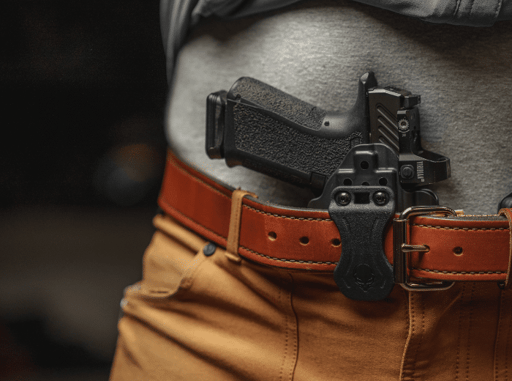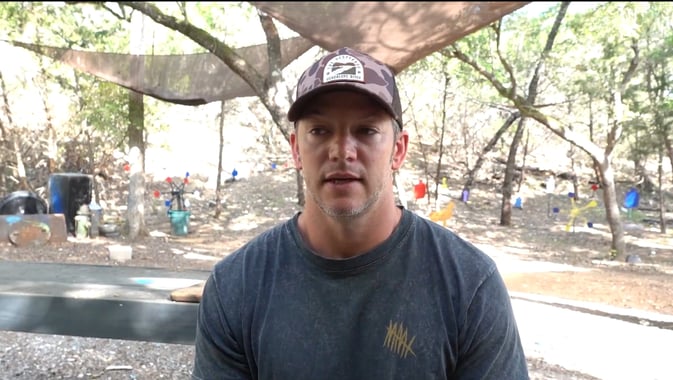We’re always excited to get e-mails from our readers. A recent e-mail included an inquiry for things to look for when seeking out instruction.
[Email]…What should I look for in a training facility? Should they be NRA certified? Should they be ex-military? What should the training involve? Thank you for any advice you have on this.
We constantly push the need for training. Whether it’s reality-based, scenario-driven training or just familiarization with firearms and safe practices, each gun owner has a responsibility to take charge of his or her gun. After all, if rounds need to be fired, don’t you want to be in the best place to ensure they land on target?
State Mandated Gun Safety Courses
Most states require some form of training certification as a piece of the application package for a concealed carry license permit. That training can range from a basic Hunting & Wildlife safety course/NRA basic pistol safety course to state-certified instruction.

When you take a concealed carry-specific course, that course should always include the following:
- Basic familiarization with state law
- Classroom discussion
- Firearm safety
- Live fire training
The NRA Basic Pistol Safety course, for instance, can be completed mostly online and covers most of the topics mentioned above — with the exception of state-specific law and live-fire.
If you take the course through an NRA certified trainer, check to see if he or she incorporates state law discussion and live fire. This is directly for your benefit as a daily concealed carrier. You should be informed as to how your state law considers use of force subject matter.
When seeking out state-mandated training requirements, refer to the issuing authority’s specifications. For instance, in Idaho, the Attorney General’s Office gives the following guidelines for proving competency with a firearm:
via Idaho’s Attorney General’s FAQ
- Hunter education or hunter safety course approved by the Idaho Department of Fish and Game or a similar agency of another state;
- A National Rifle Association firearms safety or training course or any National Rifle Association hunter education course;
- A firearms safety or training course or class offered by a law enforcement agency, community college, college, university, or private or public school or firearms training school. You may wish to utilize instructors certified by the National Rifle Association or the Idaho State Police;
- A law enforcement firearms safety or training course or class offered for security guards, investigators, special deputies, law enforcement agencies or security enforcement agencies.
Just in Idaho, there are more than four routes to prove proficiency with a firearm as a prerequisite of obtaining a concealed carry permit.
The National Rifle Association is a respected organization by many state-level authorities. If the NRA is listed explicitly as a potential source of state-level concealed carry training, you will need to pursue that training through an NRA-certified instructor. They’re not hard to find. Finding an instructor that’s willing to engage you, the student, in a course of instruction that can apply to your daily life is important.

Not ALL states require some training component in order to obtain a concealed carry permit. For the growing number of permitless carry states, the individual is given the choice to pursue a level of training he feels is sufficient to carry a gun.
What To Look For In Trainers When Certification Is NOT An Issue
Training outside of the concealed carry certification process is left more up to the student, i.e. you. When it comes to taking a beginner’s course in handguns or firearms, you don’t need an instructor that has any particular background so long as he has a proven record of teaching safe, responsible firearm practices.
An instructor should always have the following:
- A curriculum of what is included in the course
- Requirements for the student: gear, prior knowledge, etc.
- A background in firearms-related instruction
- Primary focus on safety in the classroom and on the range
What you need is an instructor who not only understands firearms but also understands how people learn new skills and retain those skills. He or she also needs to be able to talk to your level of understanding. If the instructor uses words you don’t understand, you will either need to ask him questions or he will need to rephrase those terms so you get them.
Backgrounds that can prove helpful:
- Active career instructor for either the military or law enforcement
- National and/or State-level recognition for instruction from organizations such as the International Pistol Shooting Confederation, National Rifle Association, and others
- Has a defensive mindset when teaching curriculum
- Has a curriculum — not just a bunch of bullet points
- Understands that the average concealed carrier will not likely be in harm’s way during his or her lifetime and should train the student to avoid those scenarios while still instructing him to be competent in how to handle them
- Active experience doing reality-based scenarios for military and law-enforcement
There’s no guarantee that just because a person has all of these attributes that he or she will be right for you.
Don’t be afraid to be skeptical.
Don’t be afraid to check credentials.
Don’t be afraid to ask other students what they thought about the course.
There’s probably more than a few “slick Willys” who promise all sorts of magical shooting skills if you pay the course fee. There’s no sense in showing up to a handgun course if it will not directly help you. The exception to that previous statement would be if you think a course will be so thoroughly entertaining and fun that you don’t mind that it will have little to no applicability to your own life. It’s your time and money, after all.
For those looking to get into advance handgunnery courses, you have to be bold in your questions. Don’t look at the price tag — look at the quality of instruction and what you anticipate you can get out of it. Talk with the instructor. Tell him what you are looking to do and hear what he or she has to say about it. If that instructor doesn’t speak to you as the individual client and student, check out another instructor. You will always find someone who is willing to teach you more about guns.
Dispelling Fundamental Myths About Firearms Training For Concealed Carriers
Things that can be surprisingly not useful when seeking out a firearms instructor:
- Military experience
- Law enforcement experience
Just because a person served 5-30 years in the military doesn’t make him qualified to teach you about firearms. Military and law enforcement experience varies greatly from person to person. Some people may have completed their time in either profession with little to no actual exposure to firearms instruction or training.
Additionally, for both military and law enforcement, their priorities in a gun fight do not necessarily apply to a civilian.
Military-style handgun and rifle training is geared towards offensive more than defensive operations. For instance, in the Marine Corps, the most basic of tenet of infantry tactics is: close distance with your enemy and kill them.
Thus, when training infantry-level tactics to Marines, the majority of our firearms training will prioritize suppressive fire, marksmanship, and generally moving in the direction of our enemy… Because our goal is to kill them.
That’s not very helpful in the civilian world. Sure, you may have to use your concealed carry pistol to defend yourself and that may result in the death of your opponent but killing your enemy is not the explicit (nor outright legal) goal of civilian firearms usage.
In the civilian world, we use a term called “defensive operations“. That means when we engage opponents, the goal is to secure a pathway for us and those around us to get to safety. We’re not trying to close the distance between ourselves and the enemy — we’re trying to put distance between us. We’re not outright trying to kill our opponent — we’re trying to neutralize him so he poses no further risk to us or anyone around us.
These are important distinctions to make.
A failure by the instructor to make those distinctions can result in himself or one of his students ending up in a court room or jail cell. It’s also just wildly irresponsible.
Other things not useful in firearms instruction:
- Tall tales, bravado
- A cool YouTube channel (i.e. Cult of Personality)
- Pictures of the instructor with famous people
There is no room for bravado or machismo in an instructional environment. You’re there to learn, not be impressed by your instructor. He should be competent — that’s a basic expectation. Him trying to constantly prove his competence is superior to yours is not useful.
Flip Side of the Coin: You, as the student, need to be open to learning. You need to listen to instruction and try to apply those fundamentals to your practice. Your job isn’t to constantly drive a wedge in between the instructor or your fellow classmates.
 A good instructor is not afraid to get hands-on with his students and ensure they understand the basics of firearm safety and marksmanship.
A good instructor is not afraid to get hands-on with his students and ensure they understand the basics of firearm safety and marksmanship.
Other things not useful to you, the student:
- Lots of certifications from organizations you don’t know
If you can’t recognize the accrediting organization on a fancy certificate, look it up. Don’t be afraid to ask your instructor what some certificate up on the wall actually means. Most instructors who legitimately have earned recognition are unafraid to be questioned about their qualifications.
REMEMBER: Training is YOUR TIME and YOUR MONEY. No one has a right to waste it but you.
RECAP
When seeking instruction on the use of firearms, consider the goal of the training.
Is the goal:
- mandatory concealed carry training for a state permit AND/OR
- personal growth and development?
Where the goal is “mandatory concealed carry training”, check with your issuing authority to see what courses fulfill those requirements and then ensure the instructor has the proper credentials and experience to teach that course.
When the option is “personal growth and development”, credentials still count but they are more of a way to prove to you, the consumer, that the instructor has experience teaching students. You should ALWAYS:
- Ask questions about an instructor’s certifications and credentials
- Talk to students who previously took the class
- Tell the instructor what you are looking to do/develop in your own gun carrying practices
- Be willing to learn
- Be willing to have fun in a safe, helpful environment
Don’t be afraid to shop around, ask pointed questions to the instructor, and honestly see what’s available in your area. You may be surprised by how much you can improve in your concealed carry practices by taking a course with the right instructor.














![[VIDEO] Does Your Leather Holster Squeak? Here Are Some Tips To Fix It](https://imagedelivery.net/sbm_lYeJbALkepJgtmRD5w/concealednation.org/2014/10/thumbnail-template.jpg/w=728,h=381)